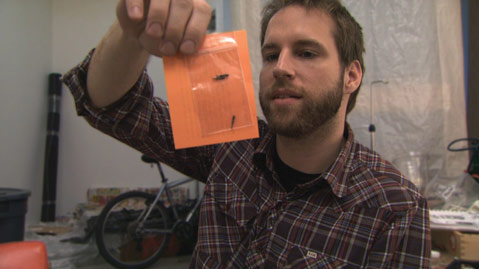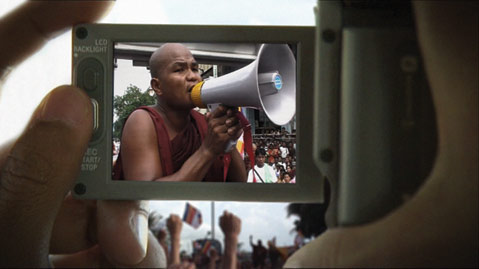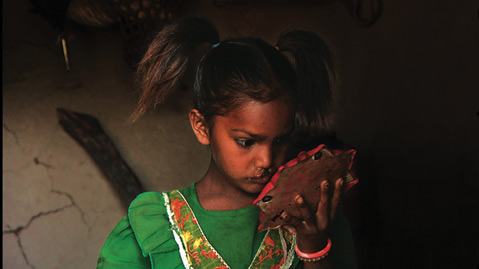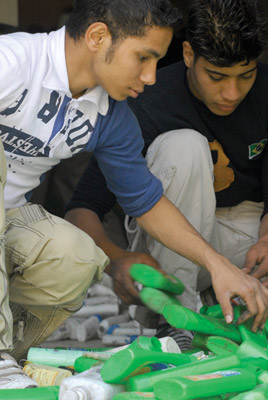April’s Showers of Tears and Hope
The Fifth Annual Human Rights Film Festival Comes to UCSB

In 2006, UCSB’s Arts & Lectures ignited a great tradition of hosting an annual series of films that focus on human rights across the globe. Now in its fifth year, the Human Rights Film Festival has expanded from a two-night extravaganza to a full month of screenings, allowing Santa Barbarans to attain their social justice awareness quota every week.
A highlight of this year’s slate is Smile Pinki, the Oscar-winning short documentary about fixing children with cleft palates in rural India. When it screens at Campbell Hall on Thursday, April 22, director Megan Mylan will be in the house, and she recently reflected on the importance of documentaries that focus on human rights.
“I am an eternal optimist,” she explained. “I deeply believe that the better we know each other, the better this world is. I believe that documentaries have a unique way of doing that, of pulling someone into another world. … If [you] walk out of the theater and my characters are still in your head and in your heart, then I’ve done my job. They’ve become part of your human family. It makes it harder to have ‘the other’ in your life.” Mylan, who was an activist before becoming a filmmaker, is also proud that her doc and others “can spark very concrete action in great ways,” such as writing to government officials, donating money, and volunteering time. “I love making that sort of thing happen,” she explained.
Mylan’s Smile Pinki is but one of 10 films aiming to do just that. A rundown and schedule of the films follows.
Thursday, April 8
War and Love in Kabul (2009, 86 min.): This incomparably candid film presents a paraplegic Afghan war veteran and his would-be lover, a woman unhappily married to a polygamist. With families who’ll feud if the courtship is consummated, and a past that very much explains their commitment, this methodical examination—complete with everyday-life scenes from Kabul—is an intimate portrait of an irresolvable affair. 7 p.m.
Bliss (2009, 105 min.): Opening with a starkly scenic sequence, this narrative film examines the traditional Turkish system of honor killings, in which those who bring shame to the family—including women who’ve been raped—are murdered. Set against the natural splendors of Turkey, Bliss shows the old ways crashing into the modern mindset and the inner and outer turmoils that ensue in reconciling the two. The great acting, compelling dialogue, and lifelike tension don’t hurt either. 9 p.m.

Thursday, April 15
Burma VJ: Reporting from a Closed Country (2008, 84 min.): Perhaps the most closed-off country in the world is Burma. This in-your-face look by undercover journalists reveals how dearly its people want democracy and how much blood the ruling regime is ready to spill to stop it. Tracing how the 2007 Rangoon protests developed and played out—thanks in large part to the digitized realities of the Internet and text-messaging—this is 21st-century journalism at its best, with lives risked to get the truth out. 7 p.m.
Tagged (2009, 28 min.): Perhaps the fest’s most entertaining film is this humorous, but ultimately poignant, half-hour look at the growing potential for humans to be implanted with radiofrequency identification (RFID) tags, the same technology used in credit cards, remote keys, and pets that you don’t want to lose. The push for using this tech in humans came after 9/11, when its usefulness as an ID tool for dead first responders became clear. Since then, it’s become both a toy—why not rig your door or bike lock to open with a wave of your chipped hand?—and a threat, with some calling it the “mark of the beast” forewarned in the Book of Revelation. While RFID may prove useful for Alzheimer’s patients and police officers, this compelling doc forces you to consider the dangerous potential outcomes of every human getting tagged, which is what experts believe will eventually occur. 9 p.m.
Devils Bargain: A Journey into the Small Arms Trade (2008, 58 min.): With so much energy invested in worrying about nuclear bombs and chemical warfare, this jaw-dropping doc—which traces the flow of guns from legitimate owners to warlords everywhere—reveals that small arms are truly the real weapons of mass destruction, as their proliferation throughout the world’s hot zones has led to far more deaths than feared bombings. With one gun for every 10 people on the planet already and enough bullets made per year to kill everyone twice, it’s shocking to learn that the United States is one of the only countries standing in the way of further regulation that would immediately save lives and potentially stop conflicts. 9:30 p.m.

Thursday, April 22
A Blooming Business (2009, 52 min.): Everyone loves a beautiful flower, but this film makes you think twice before buying that special tulip or awesome anthurium by showing the eco and human implications of the global flower industry. 7 p.m.

Smile Pinki (2008, 39 min.): See introduction above for description. 8 p.m.
The Greatest Silence: Rape in the Congo (2007, 76 min.): The decade-plus-long demise of the Democratic Republic of Congo has been the bloodiest conflict since World War II, with more than four million people dead. But as rebels ravage the countryside, there have also been as many as 200,000 women brutally raped and then usually cast aside by their communities as damaged goods. This doc, directed by an American woman who herself was gang-raped in Washington, D.C., shines a light on this travesty and lets these victims finally tell their stories. Most enlightening—and daring—are the interviews with the roving rebel rapists and the evidence that the conflict persists mainly because of the West’s mineral extraction needs. 9 p.m.
Monday, April 26
Encounter Point (2006, 85 min.): The never-ending confrontation of Israel versus Palestine explodes onto the headlines everyday, but this documentary tells the quieter story of the victims of violence from both sides who are putting aside their losses to work together for peace. From an Israeli war vet whose daughter died in a suicide bombing to imprisoned Palestinians whose siblings were killed in cold blood, this group, perhaps, represents the region’s real hope for lasting resolution. 7 p.m.

Garbage Dreams (2009, 79 min.): Though it’s a city of 18 million people, Cairo has never had an official trash service. Instead, the 60,000 or so Christian Zabbaleen people have done the dirty work for generations, picking up the garbage and then recycling 80 percent of it to sell back to Egypt, China, and Western Europe. But recently, Cairo hired European haulers to come in, so the Zabbaleens have had to organize in order to save their livelihood. All this and more is featured in this doc, which focuses on three Zabbaleen teenagers, all with different dreams for the future. It’s an acute and eye-opening battle in the war against globalization. 9 p.m.
4•1•1
The Human Rights Film Festival takes place throughout April at UCSB’s Campbell Hall. Evening passes are $10 general, $8 students, and a full pass is $20 general, $16 for students. Call 893-3535 or visit artsandlectures.sa.ucsb.edu.



